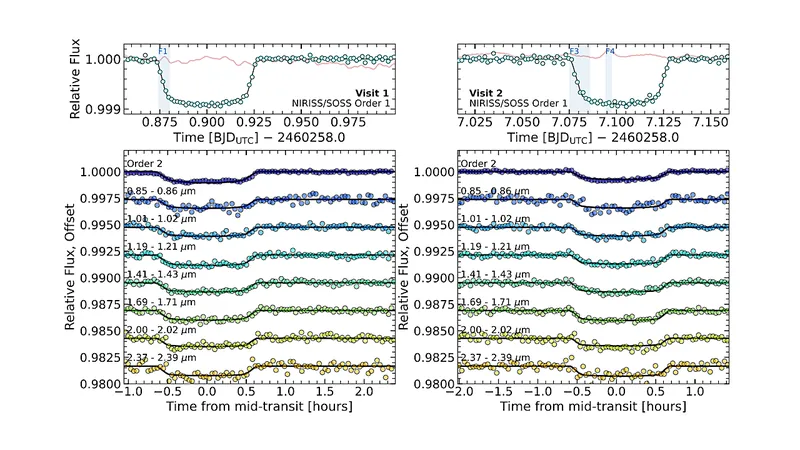
Caloric Restriction vs. Intermittent Fasting: What a Revolutionary Mouse Study Reveals About Longevity
2024-10-09
Author: Sarah
Introduction
A groundbreaking study conducted by researchers at The Jackson Laboratory (JAX) has provided significant insights into the effects of diet on lifespan, highlighting the ongoing debate over caloric restriction (CR) versus intermittent fasting (IF). While past laboratory research suggested that reduced food intake can lead to longevity across various animal species, understanding the underlying mechanisms—and how these findings apply to humans—has remained an elusive challenge.
Study Overview
The extensive mouse study tracked nearly 1,000 genetically diverse mice on varied dietary regimens. Results indicated that CR, which involved substantial reductions in caloric intake, had a more pronounced effect on extending lifespan than IF. Notably, particularly low-calorie diets increased longevity regardless of body fat and glucose levels—traditional markers of metabolic health. Surprisingly, mice that retained weight despite consuming fewer calories had superior lifespans compared to their lighter counterparts, who suffered negative health effects.
Key Findings
Lead researcher Gary Churchill, PhD, emphasized the significance of resilience in health and longevity. He pointed out that the mice that maintained their weight during caloric restriction were healthier and lived longer. This finding suggests that instead of extreme dietary restrictions, a moderate approach may better support long-term health and lifespan.
The research findings, published in the prestigious journal *Nature*, titled "Dietary restriction impacts health and lifespan of genetically diverse mice," raised vital questions regarding the evaluation of aging interventions. The authors noted a divergence between improving health and extending lifespan, indicating a more nuanced understanding of what longevity truly entails.
Genetic Diversity Considerations
An intriguing aspect of the study is its focus on the genetic diversity of the mice, which mirrors the genetic variability in the human population. By employing diversity outbred (DO) mice—who exhibit a broad range of physiological characteristics—researchers sought to ensure their findings had greater clinical relevance and applicability to human health.
Dietary Groups and Longevity Results
The mice were randomly assigned to five dietary groups: an unrestricted ad libitum feeding group, two caloric restriction groups (receiving 80% or 60% of baseline calories), and two intermittent fasting regimens (1-day and 2-day fasting each week). The longevity results were telling: mice on unrestricted diets lived an average of 25 months, while those on intermittent fasting lived about 28 months. Notably, those consuming 80% of baseline calories lived for approximately 30 months, and those on the 60% diet averaged 34 months. However, there was wide variability, with the shortest-lived mice on low-calorie diets spanning just a few months to up to four and half years.
Influence of Genetics
The study highlighted genetic factors as more influential than diet alone regarding lifespan variability. This finding underscores the importance of understanding genetic predispositions when considering dietary impacts on longevity. Churchill humorously remarked that while you can control your diet, having a long-lived ancestor may hold even more weight in your longevity prospects.
Paradox of Caloric Restriction
Moreover, the research unveiled the paradox that while caloric restriction can extend lifespan, it often correlates with decreased body weight, which seems to contradict the idea that maintaining healthy body composition supports longevity. The study shifted the focus away from conventional metabolic metrics, indicating that immune health and red blood cell traits may be better indicators of lifespan.
Implications for Human Studies
As scientists explore these findings further, they warn that traditional human studies focusing on weight loss as a marker of health may be misguided. Losing weight on caloric restriction could imply poorer long-term lifespan outcomes rather than positive health effects.
Conclusion and Future Directions
The team's conclusions signal a shift in how researchers should approach dietary interventions in humans. Metabolic changes, while beneficial, might not necessarily lead to increased lifespan, and the relationship between diet, health, and aging is more complex than previously thought.
Looking ahead, the researchers urge further investigation into whether CR or IF could extend human lifespan, acknowledging that individual genetic factors will likely play a critical role in the effectiveness of these dietary strategies. The quest for sustained longevity might just be the beginning of an exciting new chapter in nutritional science.


 Brasil (PT)
Brasil (PT)
 Canada (EN)
Canada (EN)
 Chile (ES)
Chile (ES)
 España (ES)
España (ES)
 France (FR)
France (FR)
 Hong Kong (EN)
Hong Kong (EN)
 Italia (IT)
Italia (IT)
 日本 (JA)
日本 (JA)
 Magyarország (HU)
Magyarország (HU)
 Norge (NO)
Norge (NO)
 Polska (PL)
Polska (PL)
 Schweiz (DE)
Schweiz (DE)
 Singapore (EN)
Singapore (EN)
 Sverige (SV)
Sverige (SV)
 Suomi (FI)
Suomi (FI)
 Türkiye (TR)
Türkiye (TR)